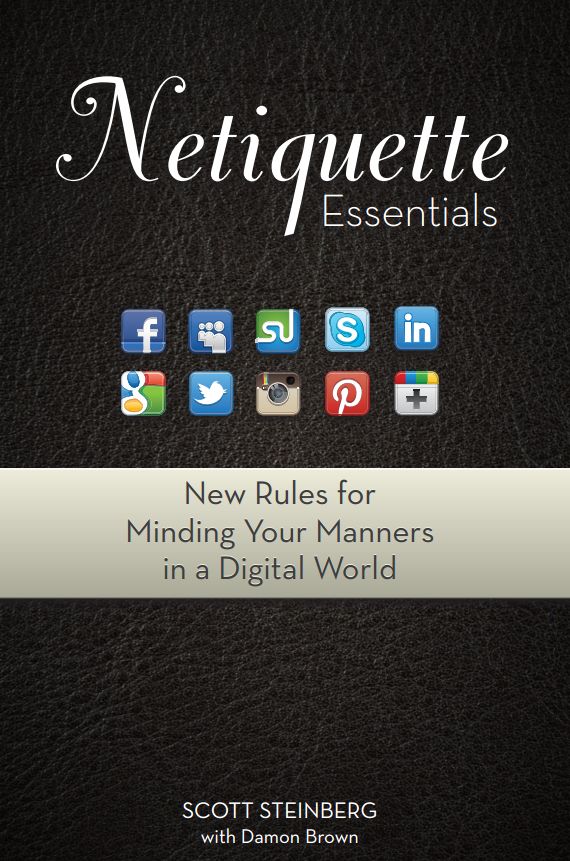By: Scott Steinberg
Social networks are one of today’s most popular forms of online communication, as utilized daily by billions of users worldwide. But they’re also among the most public and visible of digital forums – and one in which it’s increasingly important that we comport ourselves well, and treat others with dignity and respect, as we now share them with friends, family, and coworkers the globe over. Want to enjoy a safer and more positive online experience? All it takes to get the most from these magnificent technologies is just a little more mindfulness and forethought, as we discovered while researching new book Netiquette Essentials: New Rules for Minding Your Manners in a Digital World. Following, you’ll find several hints and tips that can help you lead, succeed and communicate more effectively via high-tech channels, and put your best foot forward online.
What’s OK to Share?
- Sharing extremely-opinionated viewpoints (e.g. political leanings or thoughts on controversial topics) can be a lightning rod online. Think twice before liking supporting status updates or posting such opinions, which can incite and aggravate others (and live on in perpetuity). If you feel the need to express these opinions, consider confining such communications to exchanges with individual friends, or specific subsets of these groups. Ultimately though, it’s important to remember: If you don’t have anything nice to say, perhaps it’s best left unsaid.
- Posting embarrassing, revealing or negative photos of yourself should be avoided at all costs. Remember: Images you share may be taken at face value, and/or viewed as representative of your character – not to mention live on forever on the Internet. What seems cute in high school or college may not seem quite so endearing to potential employers.
- Never post photos of others without their express permission.
- Relationship or personal drama is best kept private. If you cannot resist the urge to share, do so sparingly – and in the most vague, unspecific terms possible – for the sake of involved parties, or friends uninterested or unwilling to participate in the situation. No communications should be shared about other individuals and those involved in real-life situations without their advance permission.
- As a rule of thumb, uncomfortable or revealing personal information should be shared sparingly, if at all, and – unless acquaintances have indicated that they’re comfortable viewing this content – only with others you know in real-life.
- Never share intimate personal details including birthdates, phone numbers, addresses, schools or hometowns online, to minimize risks of crime, vandalism or identity theft. Never let others know when you’ll be away from your home, especially for any given length of time, e.g. while on vacation.
- Avoid posting on social networks unless you have a tight grasp over your privacy settings, and are completely comfortable with the group of online friends that your updates will be shared with.
Tone of Voice and Attitude
- Professionalism is imperative – if you wouldn’t say it in a social or work setting, don’t say it online, in the most public of forums.
- Politeness and respect are vital: Always be considerate of others, and treat them the way that you’d wish to be treated.
- Avoid bad-mouthing other users as it will negatively impact your image and casual bystanders may judge you based on these actions.
- Maintain a positive tone and attitude: Negativity, complaints and condescending messages often reflect poorly on the poster.
- Since social networks are shared venues enjoyed in mixed company, always avoid using vulgar language and making derogatory remarks.
- Reserve confidential discussions for private message threads or, better yet, phone calls, emails or other venues where interactions aren’t recorded in perpetuity online.
- Be advised that conversational nuances and subtle shifts in tone or personality may be lost in translation, and that individual users may interpret messages differently: Consider how posts will be read and interpreted before sending.
- Poor spelling, punctuation, grammar and choice of words can reflect equally poorly upon the individual – proofread all communications before sending. Shorthand, abbreviations and online slang should be avoided if possible, and used only in the most informal of conversations.
Being a Responsible User
- Understand that various online forums (social networks, blogs, digital communities) have their own rules of conduct, social norms and methods of interaction. Before utilizing one, take a moment to step back and observe how interactions take place, so you can discern appropriate rules of posting, sharing and behavior.
- Do not share information that online friends have shared with you in confidence, i.e. quoting someone’s private tweet to you.
- Realize that everything posted online lives on the Internet permanently, and may be available for public viewing.
- Never forget: Despite their seemingly intimacy, social networks and online forums are among the most public of spaces – it’s important to conduct yourself on them as you would in any shared setting.
- Before posting on others’ profiles or walls, or tagging them in your own posts, consider how your actions and/or statements may be perceived.
- Use privacy settings to limit who can view your posts and shares.
- When asking someone you don’t know to be your friend, send a short message explaining who you are and why you’re attempting to contact them.
Award-winning professional speaker Scott Steinberg is among today’s best-known trends experts and futurists, and the bestselling author of Netiquette Essentials: New Rules for Minding Your Manners in a Digital World, Make Change Work for You: 10 Ways to Future-Proof Yourself, Fearlessly Innovate, and Succeed Despite Uncertainty and Millennial Marketing: Bridging the Generation Gap. The founder of Select nightlife magazine, and host of Next Up on NewsWatch, his website is www.AKeynoteSpeaker.com.






